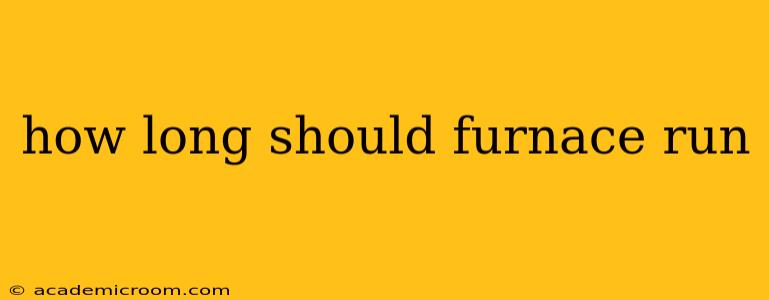How Long Should Your Furnace Run? A Comprehensive Guide
Determining how long your furnace should run is not a simple question with a single answer. The ideal runtime depends on several factors, including your home's size, insulation, climate, thermostat settings, and the furnace's efficiency. However, understanding these factors can help you optimize your system for comfort and energy efficiency. Let's delve into the key considerations.
What are the typical furnace run times?
A typical furnace cycle consists of a period of "on" time, when the burner ignites and heats the air, followed by an "off" time, when the blower circulates the heated air throughout your home. The length of each cycle varies. In milder climates, you might experience shorter on-times and longer off-times. Conversely, during colder periods, your furnace may run for longer stretches with shorter breaks. A balanced system will generally alternate between on and off cycles, avoiding excessively long continuous runs. Expect to see cycles ranging from 10-20 minutes on, followed by similar off-cycles. However, this is just a general guideline, and your actual runtime will vary.
How can I tell if my furnace is running too long or too short?
This is a crucial question! An excessively long runtime could indicate several issues such as:
- Poor insulation: Heat escapes rapidly, forcing your furnace to work harder and longer to maintain your desired temperature.
- Drafty windows and doors: Similar to poor insulation, drafts lead to heat loss, resulting in longer run times.
- Inefficient furnace: An older or poorly maintained furnace may not be as effective in heating your home, leading to extended operation.
- Incorrect thermostat settings: An improperly calibrated or programmed thermostat can cause the furnace to run unnecessarily long.
On the other hand, if your furnace runs too shortly and your home feels cold, this might indicate:
- Thermostat issues: The thermostat itself could be malfunctioning or improperly set.
- Low airflow: Restrictors in your ductwork or a faulty blower motor might reduce the amount of heated air circulating throughout your house.
- Dirty air filter: A clogged filter restricts airflow, forcing the furnace to work harder and potentially shut off prematurely due to overheating.
How can I optimize my furnace runtime for energy efficiency?
Optimizing your furnace's runtime involves a multi-pronged approach:
- Regular maintenance: Annual professional inspections and cleaning ensure your furnace operates at peak efficiency.
- Proper insulation: Investing in proper home insulation minimizes heat loss, reducing the burden on your furnace.
- Air sealing: Sealing drafts around windows, doors, and other openings prevents heat from escaping and improves efficiency.
- Programmable thermostat: Utilizing a programmable or smart thermostat allows you to customize heating schedules to suit your lifestyle and reduce energy consumption.
- Clean air filters: Regularly changing your air filters improves airflow and prevents the furnace from overheating.
Is it normal for my furnace to run continuously for an hour or more?
No. Continuous furnace operation for an extended period, especially an hour or more, is typically a sign of a problem. This could signify a serious issue requiring immediate professional attention. Don't hesitate to contact a qualified HVAC technician if you experience this.
How often should I replace my furnace filter?
The frequency of filter replacement depends on the type of filter and your household environment. A general guideline is to replace filters every 1-3 months, but more frequent changes might be necessary in homes with pets or allergies. Consult your filter's instructions for specific recommendations.
By addressing these factors and performing regular maintenance, you can ensure your furnace runs efficiently and comfortably, prolonging its lifespan and saving energy. Remember to always consult with a qualified HVAC technician for any concerns about your furnace's performance or if you suspect a problem.
